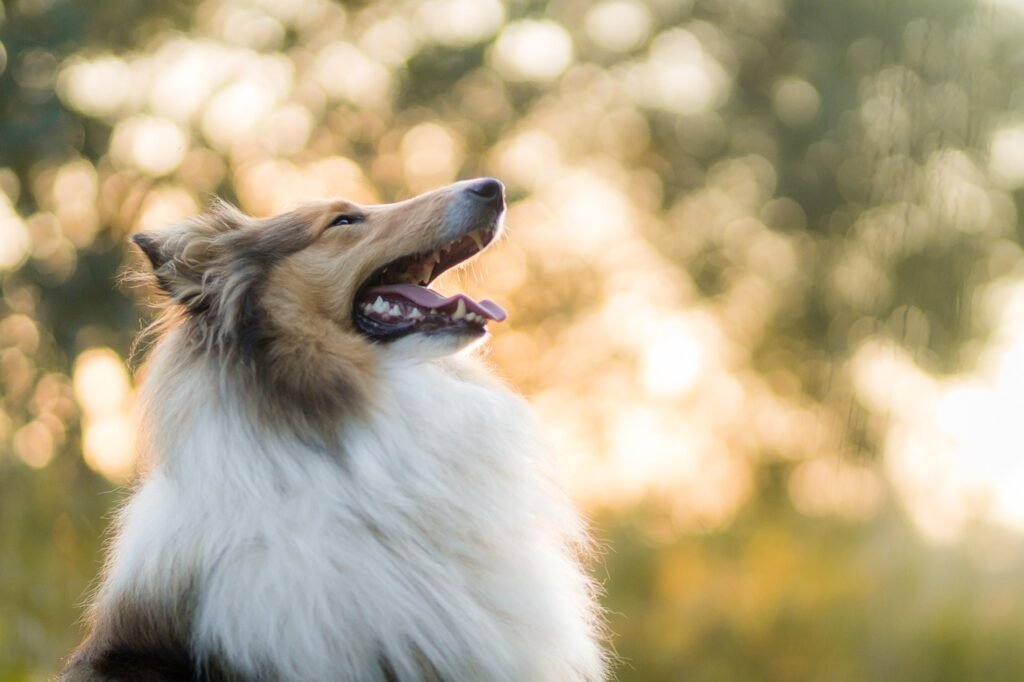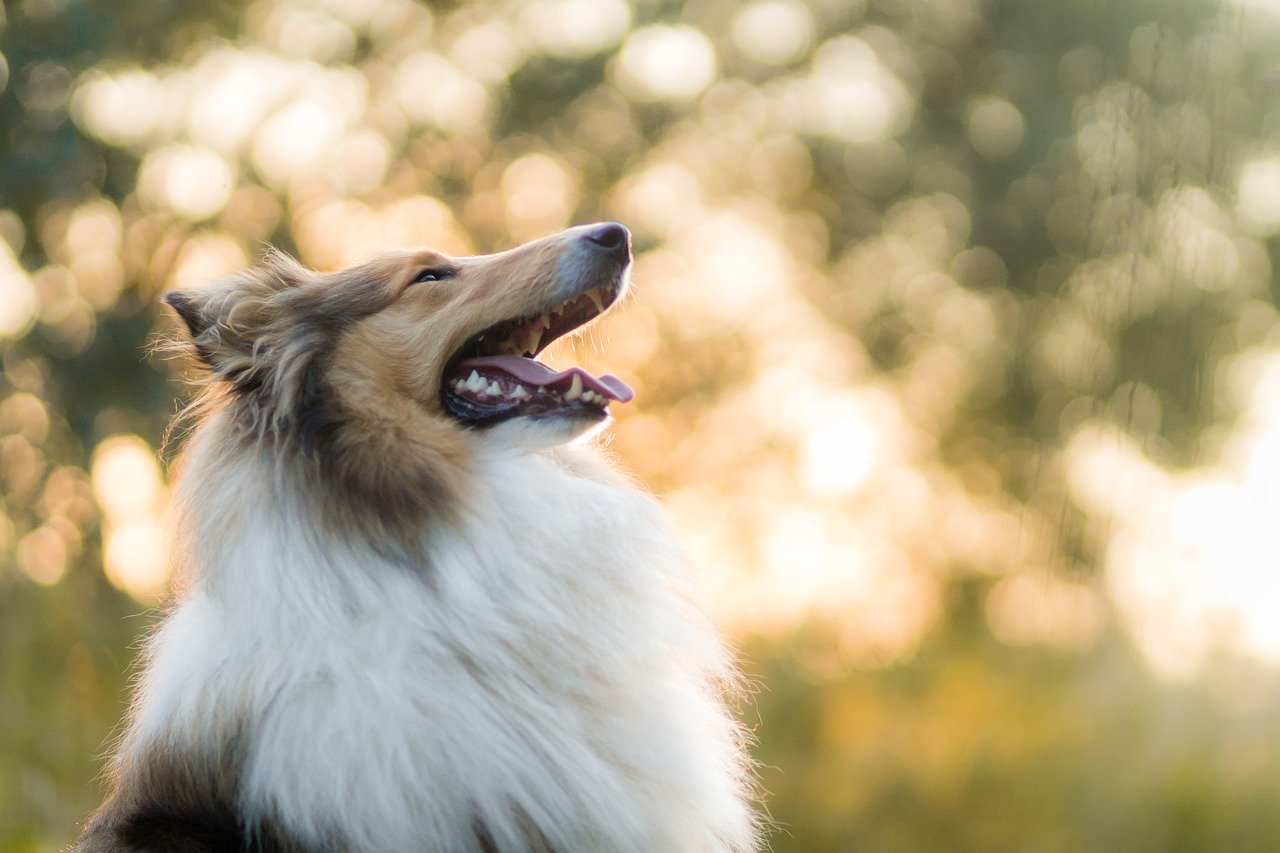If you’ve found yourself facing a stubborn roadblock when training your lovable Collie due to fear or anxiety issues, worry no more! Our furry friends can sometimes experience these emotions, preventing them from fully engaging in training sessions. But fear not, as there are practical and effective strategies you can employ to help them overcome their fears and anxieties. By understanding their triggers, implementing positive reinforcement techniques, and creating a safe and supportive training environment, you’ll soon be on your way to a happier and more confident Collie. So let’s delve into this article and discover how you can address fear or anxiety issues during training with your beloved Collie.
Understanding Fear and Anxiety in Collies
Collies, like any other breed of dogs, can experience fear and anxiety during training. It is important for you as a Collie owner to recognize the signs of fear and anxiety in your dog and understand the possible causes. By doing so, you can ensure a safe and effective training process for your furry companion.
Recognizing signs of fear and anxiety
Fear and anxiety can manifest in various ways in Collies. Some common signs to look out for include excessive panting, drooling, trembling or shaking, pacing, restlessness, and avoidance behaviors. Your Collie may also display dilated pupils, flattened ears, tucked tail, or a lowered body posture. Additionally, barking, growling, or snapping can be signs of fear aggression. It is crucial to pay attention to these signs and address them promptly to prevent further escalation of fear or anxiety.
Understanding the causes of fear and anxiety in Collies
Fear and anxiety can stem from a variety of factors in Collies. These may include past traumatic experiences, lack of socialization, genetic predisposition, fear of specific stimuli or situations, or even underlying medical conditions. Identifying the underlying cause of fear or anxiety in your Collie will help you tailor your training approach and address the issue more effectively.
The impact of fear and anxiety on training
Fear and anxiety can significantly impact your Collie’s ability to learn and retain information. When in a fearful or anxious state, your dog’s attention may be diverted, making it difficult for them to focus on training tasks. Moreover, fear and anxiety can hinder their willingness to engage in the training process, leading to reluctance or avoidance behaviors. It is important to acknowledge the impact of fear and anxiety on training and take appropriate measures to create a conducive learning environment for your Collie.
Creating a Calm and Safe Environment
To address fear and anxiety during training with your Collie, creating a calm and safe environment is of utmost importance. By eliminating or minimizing potential stress triggers, providing a designated training area, and establishing a predictable routine, you can set the stage for a more relaxed and productive training session.
Eliminating or minimizing potential stress triggers
Identifying and removing stress triggers is crucial in creating a calm environment for your Collie. Common stress triggers may include loud noises, unfamiliar people or animals, excessive handling, or crowded spaces. By reducing exposure to these triggers during training sessions, you can help your Collie feel more at ease and increase their comfort level.
Providing a designated training area
Having a designated area specifically for training can help your Collie associate that space with learning and positive experiences. This area should be free from distractions and provide enough room for your dog to move comfortably. By consistently using this designated space for training, your Collie will begin to understand that it is a safe and controlled environment.
Establishing a predictable routine
Collies thrive on routine and predictability. Establishing a consistent training routine will help your dog feel more comfortable and confident during training sessions. By following a set schedule for training activities, your Collie will come to anticipate and understand what is expected of them, reducing their anxiety levels and allowing them to focus on the tasks at hand.

Positive Reinforcement Training Techniques
Positive reinforcement training techniques can be highly effective in reducing fear and anxiety in Collies during training. By using rewards and treats to motivate your Collie, implementing clicker training for clear communication, and breaking down tasks into small achievable steps, you can create a positive and rewarding training experience for your furry friend.
Using rewards and treats to motivate your Collie
Collies, like many dogs, respond well to positive reinforcement techniques. By using rewards and treats that are highly valued by your Collie, you can motivate them to engage in training and make it a positive experience. Offering treats as a reward for desired behaviors or successful completion of tasks helps build a positive association with the training process, reducing anxiety and increasing motivation.
Clicker training for clear communication
Clicker training is a valuable technique that allows for clear and immediate communication with your Collie. By associating the sound of a clicker with a reward, you can capture desired behaviors accurately and provide instant feedback. This precise feedback reduces confusion and uncertainty, which can contribute to fear or anxiety during training sessions.
Breaking down tasks into small achievable steps
Training tasks can sometimes appear overwhelming to Collies, especially when they are experiencing fear or anxiety. Breaking down tasks into smaller, more manageable steps allows your Collie to experience success at each stage, building confidence and reducing stress. By gradually increasing the difficulty level of tasks, you can help your Collie overcome their fears and anxieties while maintaining a positive training experience.
Desensitization and Counterconditioning
Desensitization and counterconditioning techniques can be highly effective in addressing fear and anxiety in Collies. By gradually exposing your Collie to feared stimuli or situations and pairing them with positive experiences, you can build confidence and reduce the negative emotional response associated with these triggers.
Gradual exposure to feared stimuli or situations
Exposing your Collie to feared stimuli or situations in a controlled and gradual manner can help them overcome their fears. Start by presenting the trigger at a distance or intensity level that does not cause a fearful reaction, and gradually increase exposure over time. This gradual approach allows your Collie to adapt and build confidence at their own pace.
Pairing feared stimuli with positive experiences
Associating feared stimuli with positive experiences is a powerful way to change your Collie’s emotional response. For example, if your Collie is afraid of car rides, you can start by pairing short car rides with enjoyable activities such as treats, toys, or praise. This positive association helps your Collie develop a more positive outlook on the previously feared stimulus.
Building confidence through progressive challenges
As your Collie gains confidence through desensitization and counterconditioning, gradually introduce new and progressively challenging experiences or environments. This allows your dog to continue building resilience and adaptability, further reducing fear and anxiety during training. Celebrate each achievement and provide plenty of rewards and praise to reinforce positive behaviors.
Professional Help and Support
If your Collie’s fear or anxiety issues persist or escalate despite your efforts, it may be beneficial to seek professional help and support. Consulting with a certified dog trainer or behaviorist specialized in fear and anxiety-related issues can provide valuable insights and guidance tailored to your Collie’s specific needs. They can help develop a personalized training plan, offer additional strategies, and provide ongoing support throughout the training process.
Consulting with a certified dog trainer or behaviorist
Certified dog trainers or behaviorists have the knowledge and expertise to address fear and anxiety issues in Collies. They can analyze your Collie’s behavior, identify underlying causes, and customize a training program to suit their individual needs. Working with a professional can provide you with the necessary tools and techniques to effectively address fear and anxiety during training sessions.
Exploring the option of medication to reduce anxiety
In some cases, medication may be recommended to help reduce anxiety in Collies. Consult with a veterinarian or veterinary behaviorist to determine if medication is a suitable option for your dog. Medication can help alleviate the symptoms of fear and anxiety, making it easier for your Collie to engage in training and learn new behaviors.
Joining support groups or online communities
Joining support groups or online communities dedicated to Collie training and behavior can provide you with a network of like-minded individuals who are facing similar challenges. These groups can offer valuable support, advice, and encouragement throughout your training journey. Learning from others’ experiences and successes can help you navigate through any obstacles you may encounter.
Creating a Bond of Trust
Building a strong bond of trust with your Collie is essential for effective training and reducing fear and anxiety. By developing a positive and consistent communication style, using calm and reassuring body language, and respecting your Collie’s boundaries, you can foster a deep sense of trust and create a stronger relationship with your furry companion.
Building a strong foundation of trust with your Collie
Trust is the cornerstone of any successful training relationship. Spend time bonding with your Collie through activities they enjoy, such as play sessions or relaxing together. Be patient, understanding, and consistent in your interactions. This will help your Collie feel secure and confident in your presence.
Developing a positive and consistent communication style
Consistency in your verbal and non-verbal communication is key to building trust and reducing fear or anxiety. Use clear and concise commands, reward desired behaviors promptly, and avoid punitive actions or harsh corrections. Consistency provides predictability and stability for your Collie, helping them understand what is expected of them.
Using calm and reassuring body language
Your body language can have a significant impact on your Collie’s emotional state. Displaying calm and reassuring body language, such as relaxed posture and gentle gestures, helps your Collie feel safe and secure. Avoid aggressive or threatening body language, as this can contribute to fear or anxiety.
Patience and Consistency
Training Collies with fear or anxiety issues requires patience and consistency. Understanding that progress may take time, being consistent in training methods and expectations, and reinforcing positive behaviors consistently are essential elements in helping your Collie overcome their fears and anxieties.
Understanding that progress may take time
Overcoming fear and anxiety is a gradual process, and it is important to be patient with your Collie. Each dog is unique, and progress will vary from one individual to another. Acknowledge and celebrate even the smallest steps forward, as they contribute to overall improvement over time.
Being consistent in training methods and expectations
Consistency is crucial when training Collies with fear or anxiety. Stick to a specific training method or approach and apply it consistently throughout the training process. This consistency helps your Collie understand what is expected of them, fostering a sense of security and reducing stress.
Reinforcing positive behaviors consistently
Consistently reinforcing positive behaviors is essential in overcoming fear and anxiety. Whenever your Collie displays desired behaviors, promptly reward them with praise, treats, or play. This positive reinforcement strengthens the desired behaviors and helps your Collie associate them with positive experiences, gradually replacing fear and anxiety with confidence and trust.
Gradual Exposure and Controlled Training Sessions
Gradual exposure and controlled training sessions play a vital role in helping Collies with fear or anxiety issues overcome their challenges. By gradually introducing new experiences and environments, using controlled environments for training, and setting realistic goals and expectations, you can facilitate a positive learning process for your Collie.
Gradually introducing new experiences and environments
Introducing new experiences and environments gradually allows your Collie to adapt at their own pace. Start with low-stress situations and gradually increase the level of difficulty as your Collie becomes more comfortable. This gradual exposure promotes a sense of security, reduces fear, and fosters a positive attitude towards unfamiliar stimuli or situations.
Using controlled environments for training
Training in controlled environments helps minimize distractions and potential stress triggers, allowing your Collie to focus on the training tasks at hand. Start with training sessions in quiet and familiar locations, gradually increasing the level of external stimulation as your Collie becomes more confident and responsive.
Setting realistic goals and expectations
Setting realistic goals and expectations is essential when training Collies with fear or anxiety. Recognize that progress may take time and that each dog’s journey is unique. Break down complex tasks into smaller, more manageable steps, and celebrate each accomplishment along the way. By setting realistic goals and expectations, you can create a positive training experience for your Collie and promote ongoing improvement.
Managing Fear and Anxiety During Training
It is crucial to manage fear and anxiety in your Collie during training to ensure a positive and productive experience. By recognizing signs of fear or anxiety, implementing calming techniques such as deep breathing, taking breaks, and providing reassurance as needed, you can help your Collie feel safe, secure, and more receptive to learning.
Recognizing signs of fear or anxiety during training
Regularly monitoring your Collie’s body language and behavior during training sessions allows you to identify signs of fear or anxiety early on. Look for subtle cues such as lip licking, yawning, excessive sniffing, or avoidance behaviors. If you notice any signs of fear or anxiety, it is important to address them promptly to prevent further escalation.
Implementing calming techniques, such as deep breathing
When your Collie shows signs of fear or anxiety, implementing calming techniques can help them relax and refocus. Deep breathing exercises, both for you and your dog, can help regulate heart rate and reduce stress levels. Take slow, deep breaths together, maintaining a calm and relaxed atmosphere during training sessions.
Taking breaks and providing reassurance as needed
If your Collie becomes overwhelmed during training, it is important to take breaks and provide reassurance. Allow your Collie to relax and decompress before resuming training. Comforting words, gentle petting, or a favorite toy can help your Collie feel safe and supported. Taking breaks and providing reassurance allows your Collie to reset and continue with a positive mindset.
Maintaining a Positive and Supportive Attitude
Maintaining a positive and supportive attitude is vital when training Collies with fear or anxiety. By avoiding punishment-based training methods, focusing on progress and small achievements, and celebrating successes while providing encouragement, you can create a motivating and enriching training experience for your Collie.
Avoiding punishment-based training methods
Punishment-based training methods can be detrimental for Collies with fear or anxiety. Harsh corrections or punishments can intensify their fear and anxiety, erode trust, and hinder the learning process. Instead, focus on positive reinforcement techniques that reward desired behaviors, promoting a positive and supportive training environment.
Focusing on progress and small achievements
Acknowledging and celebrating progress, no matter how small, plays a significant role in motivating Collies with fear or anxiety. Each step forward, each successful completion of a task, deserves recognition and praise. Focusing on progress and small achievements boosts your Collie’s confidence, reinforces positive behaviors, and encourages continued improvement.
Celebrating successes and providing encouragement
Creating a supportive and motivating atmosphere during training is crucial for Collies with fear or anxiety. Whenever your Collie achieves a training goal or displays a desired behavior, celebrate their success with enthusiasm. Use verbal praise, rewards, or play to reinforce their accomplishments. Providing encouragement and positive feedback helps build your Collie’s confidence and promotes a positive attitude towards training.
In conclusion, addressing fear and anxiety during training with your Collie requires patience, understanding, and a holistic approach. By recognizing the signs of fear and anxiety, creating a calm and safe environment, using positive reinforcement techniques, implementing desensitization and counterconditioning, seeking professional help and support as needed, and maintaining a positive and supportive attitude, you can help your Collie overcome their fears, build trust, and achieve success in their training journey. Remember, each dog is unique, and progress may vary, so be patient, consistent, and adaptive in your approach. With time, effort, and love, you can help your Collie become a confident, well-adjusted companion.

